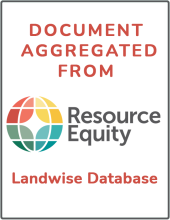Land Library
Welcome to the Land Portal Library. Explore our vast collection of open-access resources (over 74,000) including reports, journal articles, research papers, peer-reviewed publications, legal documents, videos and much more.
/ library resources
Showing items 1 through 9 of 74.The Reducing Emissions from Deforestation and Forest Degradation program, or REDD+, has been the international community’s first real attempt to create a global forest governance system which would impact countries on national, regional and even local scales.
The report explores the evictions of pastoralists and other conflicts over pastoralists’ land in Tanzania, with focus on the past decade.
In Senegal, concern about large-scale land acquisitions has been growing since 2000. Senegalese agriculture has long relied on small-scale family holdings and extensive agriculture.
Large-scale land acquisitions continue to be an important issue for governments, development organisations, NGOs and farmers’ organisations all over the world; this remains the case even in times of global economic slowdown, recession and crisis.
The Lao Land and Forest Allocation Policy (LFAP) was intended to provide clearer property rights for swidden farmers living in mountainous areas. These lands are legally defined as “State” forests but are under various forms of customary tenure.
Over the past decade, Laos has experienced a land rush by foreign investors seeking to gain large tracts of land for hydropower, mining, and plantation projects.
Thirty years after Cambodia’s ‘democratization’ by the United Nations Transitional Authority (UNTAC), the transition to a market-based economy is raging at full steam.
Scholars have produced valuable insights on the question of recent “land grabbing” in the global South. They have, however, insufficiently studied the issue from below, particularly from the point of view of a crucial group in the land conundrum: the rural youth.





